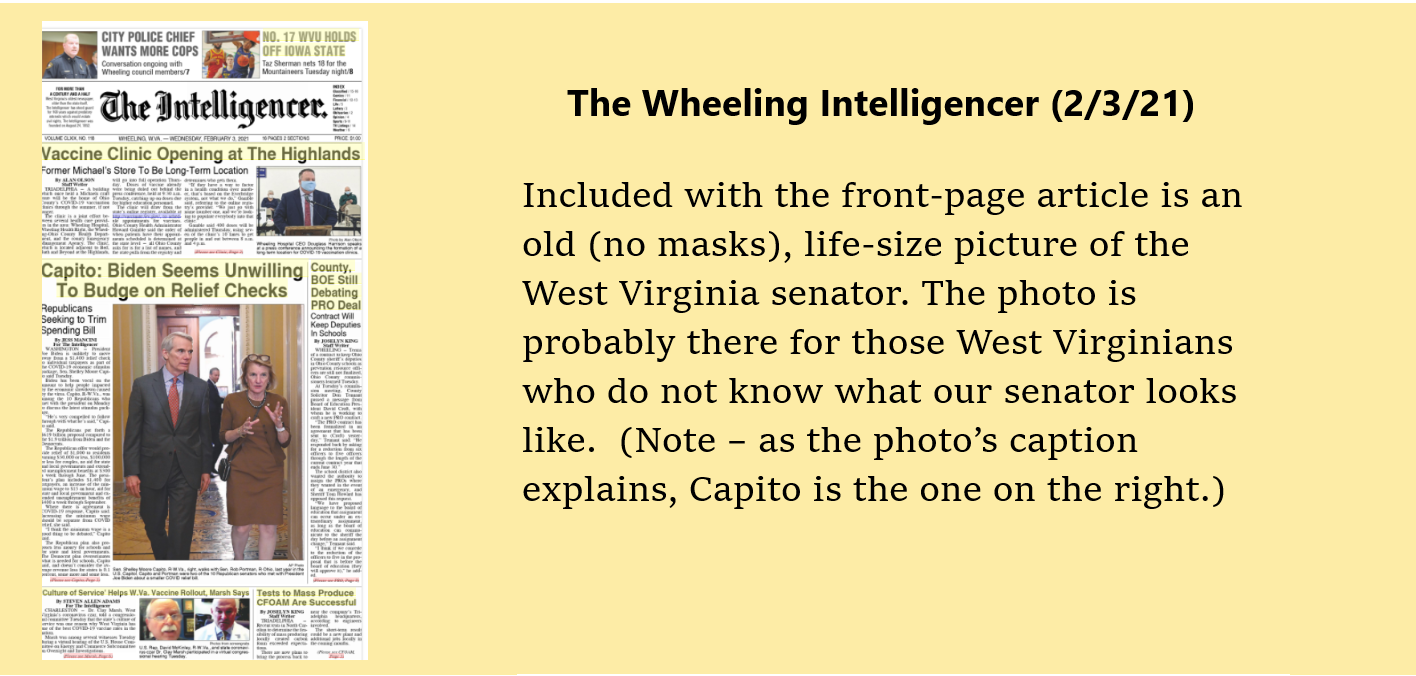Yesterday, Senator Shelley Moore Capito explained the debate over a coronavirus relief package to the state’s stenographers
Lucky for us, an Ogden representative participated

Yesterday, West Virginia’s junior senator, Shelley Moore Capito, met online with some West Virginia media to discuss the Republican and Democratic coronavirus stimulus plans. Jess Mancini (from another Ogden paper) wrote the story for today’s Wheeling editions. Most of the article consists of Capito explaining the Republican position with no pushback from the media. For example:
The Republican plan also proposes less money for schools and for state and local governments. The Democrat plan overestimates what is needed for schools, Capito said, and doesn’t consider the average revenue loss for states is 0.1 percent, some more and some less.
A one-tenth of one percent loss? Shouldn't a reporter have enough economic sense to realize that Capito's figure is, most-likely, wildly inaccurate. For example, here is the most recent conclusion from the Tax Policy Institute.
Some argue that states do not need assistance because of better than expected tax collections. But the State and Local Finance Initiative’s data show the actual revenue losses experienced by the states are deep and widespread, if not universal. . . .
In total, state tax revenues declined 5.3 percent from April to September compared with the same period a year earlier according to our preliminary data. But there is a lot of variability across states.
5.3% is a whole lot worse than .1% (Note that the Initiative's data begins in April -- I could not find statistics that started in March and ended in December. In my opinion, adding those months, especially March, would likely not have reduced the revenue loss to .1%.)
What about cities? The declining revenue is even worse for them:
On average, cities across the country have seen revenues contract 21% since the pandemic started, according to a December report from the National League of Cities (NLC).
Okay, I did not expect an Ogden stenographer to have done some pre-interview research which pointed to aid to states and cities as a major difference in the two plans, but couldn’t the one-tenth of 1 percent be checked before the article was written? Of course not, these are stenographers and besides, Capito always gets a pass.
Speaking of Capito's media pass, Hoppy Kercheval had the senator on his show yesterday. They talked about the differences between the Republican and Democratic plans. Capito explained the Republicans plan to give a much smaller amount to the unemployed by arguing “a lot of predictions from economists” believe that unemployment will be what it was pre-pandemic by the 2nd quarter of this year. Huh? And so I looked for an economist who said this but could not find any. On the hand, here’s the Congressional Budget Office on Monday:
The number of people working, says the CBO, should return to its pre-pandemic levels by 2024, earlier than expected.
C'mon Hoppy, you knew better.
Bipartisanship, compromise, and unity (but only on Republican terms)
Here’s Capito from the article:
Capito said she remains hopeful a bipartisan agreement can be reached on the stimulus plan. However, it also depends on where the Democratic leadership would be willing to compromise.
“That I don’t know,” Capito said.
What about Republican leadership, Senator? Or is compromise something only Democrats should do despite the fact that when Republicans are in power, they make no effort to compromise. It may be that if the Democrats cannot get the necessary votes on their relief bill, they will use budget reconciliation which will only require a majority. In that case, cue the howling from Republicans and our local propaganda outlets.
Republican hypocrisy on compromise and bipartisanship? Here are two examples on two important bills from the Trump presidency:
Senate Republicans in January 2017 tried to do a lightning-strike repeal of the Affordable Care Act via reconciliation. They moved a budget to do so even before Trump was sworn into office. Their unity/healing arguments now are the opposite of what they said then. https://t.co/gYspR8lQ1v
— Steven Dennis (@StevenTDennis) January 27, 2021
And:
Don't mind me, just perusing the partisan roll call votes for the $2.9 trillion tax cuts for the mega-rich that the GOP rammed through via reconciliation in 2017.
— Dan Lavoie (@djlavoie) February 2, 2021
Anyway, about those good-faith arguments they're making now... pic.twitter.com/TIfm6jhKhZ
Yeah, like confirming Supreme Court judges in election years, the new rules say that it’s only the Democrats who must compromise.